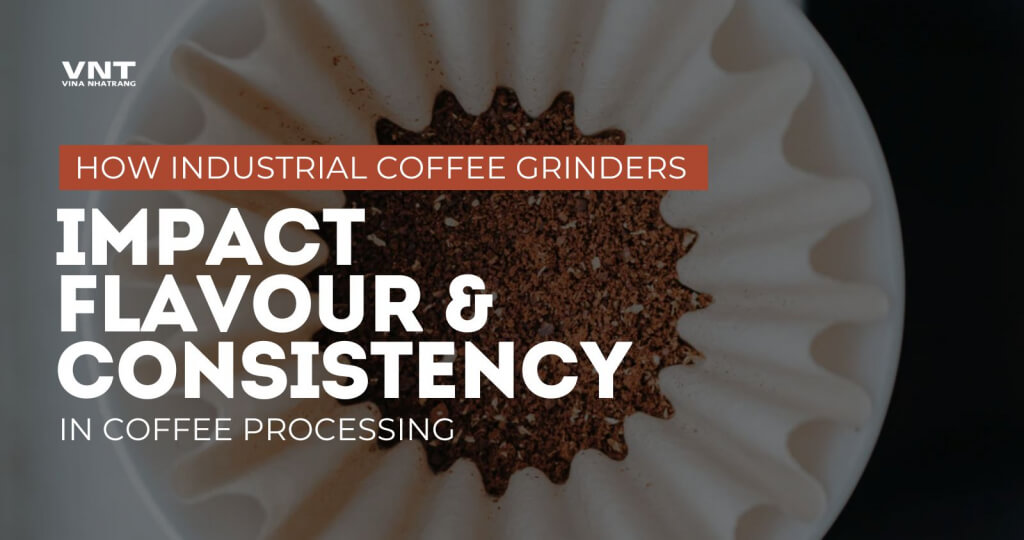In the world of coffee, the quality of the grinder you use can significantly influence the flavor and consistency of your brew. This article delves into how industrial coffee grinders play a pivotal role in determining the taste and aroma of your coffee, ensuring a balanced and enjoyable cup.
Need an Industrial Coffee Grinder? Explore VNT’s Industrial Coffee Grinder
The Role of Grind Size in Flavor Extraction
The grind size is a critical factor in coffee extraction. When coffee beans are ground, their surface area increases, allowing for more efficient extraction of flavor compounds from the beans into the water. This process results in a stronger, more flavorful cup of coffee. However, the size and consistency of the grind can also affect the brewing process itself. A fine grind will extract more flavor but may lead to over-extraction and a bitter taste, while a coarse grind will extract less flavor but may result in a weak and under-extracted cup of coffee
Consistency and Quality of Grind
Using a consistent grind size ensures that all coffee beans are extracted at the same rate, resulting in a more balanced and consistent flavor profile. This consistency is vital for achieving a balanced and well-rounded flavor profile in your coffee. Different brewing methods require specific grind sizes to optimize extraction. For example, espresso calls for a fine grind to extract flavors quickly, while a French press requires a coarse grind to allow for a longer steeping time
The Impact of Grinder Type and Material
The type of industrial coffee grinder you use can significantly influence the quality of your coffee. For instance, blade grinders tend to produce a less uniform grind compared to burr grinders. This can result in a less balanced flavor profile because the coffee beans might not be ground evenly. The material of the grinding disc is also very important. Steel is a popular choice in the coffee industry because it’s durable and can handle the tough task of grinding coffee beans. There are different types of steel, such as die-cast and tungsten carbide, each with its own benefits. Die-cast steel is known for being strong and durable, making it great for grinders that need to handle a lot of coffee. Tungsten carbide, on the other hand, is very resistant to wear and tear, making it ideal for grinders that are used frequently.
Explore our in-depth guide on Types of Industrial Coffee Grinders
Burr grinder
Burr grinders, which use a pair of abrasive surfaces or “burrs” to crush the coffee beans into a consistent grind size, are particularly noted for their ability to produce a more consistent grind compared to blade grinders. This consistency is crucial for achieving a balanced flavor profile in your coffee. Ceramic burr grinders, for example, are known for their durability and the fact that they generate less heat when grinding, which can help preserve the coffee’s flavor and aroma. However, they might be more expensive and less resilient, making them more prone to breakage if dropped.
Steel burr grinders
Steel burr grinders, while more affordable initially, are also durable and less likely to break if mishandled. However, their burrs may wear out more quickly than ceramic ones, requiring more frequent replacements. Additionally, steel burr grinders can generate higher heat levels during grinding, which could potentially alter the coffee’s taste.
Ceramic grinders
In terms of performance and speed, ceramic grinders are renowned for their longevity and sharpness, making them ideal for those who prioritize consistency and precision, especially for espresso. However, their speed might not always match that of steel grinders, which tend to have sharper blades and offer a faster grinding experience. This makes steel grinders well-suited for brewing methods that require a coarser grind, such as French press or cold brew.
Stainless steel grinders
When it comes to cost and convenience, ceramic grinders are generally more expensive than their stainless steel counterparts due to their longer-lasting components and consistent performance. However, if you’re working with a tighter budget, stainless steel grinders may be a more affordable option. In terms of durability, ceramic grinders can outlast steel ones because they are less likely to dull, warp, or become blunt, which means lower recurring costs for the user.
Minimizing Heat Generation
The process of grinding coffee can generate heat, and excessive heat can lead to flavor loss. A high-quality industrial coffee grinder minimizes heat generation during the grinding process. Heat can cause the volatile flavor compounds in coffee to evaporate, resulting in a loss of aroma and taste. Additionally, excessive heat can alter the chemical composition of the coffee, leading to a burnt or bitter flavor. By using a industrial coffee grinder with precise burrs and avoiding excessive heat, you can preserve the delicate flavor compounds and enjoy a more flavorful cup of coffee
Conclusion
Contact our experts to get a consultation on choosing the best Industrial Coffee Grinder that fits you business needs
In summary, the quality of a coffee grinder, particularly the material of its grinding disc, plays a significant role in determining the flavor and consistency of the ground coffee. By choosing a grinder with a high-quality grinding disc, businesses can ensure that their coffee is ground to perfection, bringing out the best in their coffee beans. Whether you’re a home brewer or a coffee shop owner, investing in a high-quality industrial coffee grinder can significantly enhance the taste and aroma of your coffee, ensuring a more enjoyable and satisfying brewing experience.

